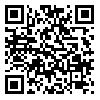دوره 21، شماره 4 - ( 9-1403 )
جلد 21 شماره 4 صفحات 28-24 |
برگشت به فهرست نسخه ها
Download citation:
BibTeX | RIS | EndNote | Medlars | ProCite | Reference Manager | RefWorks
Send citation to:



BibTeX | RIS | EndNote | Medlars | ProCite | Reference Manager | RefWorks
Send citation to:
Başgöl Ş, Elmas S, Yurtçiçek Eren S. Examining religious attitudes and mental well-being in post-earthquake trauma. J Res Dev Nurs Midw 2024; 21 (4) :24-28
URL: http://nmj.goums.ac.ir/article-1-1849-fa.html
URL: http://nmj.goums.ac.ir/article-1-1849-fa.html
Examining religious attitudes and mental well-being in post-earthquake trauma. Journal of Research Development in Nursing and Midwifery. 1403; 21 (4) :24-28
چکیده: (2544 مشاهده)
Background: Natural disasters, such as earthquakes, can traumatize survivors and affect various aspects of their lives, including mental health and quality of life. This study explores religious attitudes, mental well-being, and post-earthquake trauma among female survivors of the 2023 Kahramanmaraş earthquake in Türkiye.
Methods: This cross-sectional study was conducted from 18 May to 18 June 2023, involving 618 female survivors aged 18 and older affected by the 2023 Kahramanmaraş Earthquake. Participants voluntarily completed an online survey via social media platforms and group forums. The data were collected using a “sociodemographic form,” “The Ok-Religious Attitude Scale,” “The Warwick-Edinburgh Mental Well-being Scale,” and “Post-Earthquake Trauma Level Determination Scale.” Data analysis was conducted using SPSS 25.0. Descriptive statistics were presented using numbers, percentages, means, and standard deviations. Independent samples t-tests and one-way ANOVA were conducted to compare the means between groups. Pearson’s correlation was used to assess relationships between continuous variables, and linear regression was performed for further analysis. The significance level for all analyses was set at p < 0.05.
Results: Female survivors demonstrated strong religious beliefs, maintained good mental well-being, and reported below-average levels of post-earthquake trauma. A significant positive relationship was found between women's religious attitudes and mental well-being (r=0.57, p=0.0001). Additionally, there was a significant positive relationship between religious attitudes and trauma levels (r=0.20, p=0.0001). Furthermore, mental well-being and trauma levels were significant predictors of religious attitudes.
Conclusion: Healthcare professionals should consider the role of religious beliefs in coping with trauma and maintaining mental well-being in counseling, intervention, and support strategies.
Methods: This cross-sectional study was conducted from 18 May to 18 June 2023, involving 618 female survivors aged 18 and older affected by the 2023 Kahramanmaraş Earthquake. Participants voluntarily completed an online survey via social media platforms and group forums. The data were collected using a “sociodemographic form,” “The Ok-Religious Attitude Scale,” “The Warwick-Edinburgh Mental Well-being Scale,” and “Post-Earthquake Trauma Level Determination Scale.” Data analysis was conducted using SPSS 25.0. Descriptive statistics were presented using numbers, percentages, means, and standard deviations. Independent samples t-tests and one-way ANOVA were conducted to compare the means between groups. Pearson’s correlation was used to assess relationships between continuous variables, and linear regression was performed for further analysis. The significance level for all analyses was set at p < 0.05.
Results: Female survivors demonstrated strong religious beliefs, maintained good mental well-being, and reported below-average levels of post-earthquake trauma. A significant positive relationship was found between women's religious attitudes and mental well-being (r=0.57, p=0.0001). Additionally, there was a significant positive relationship between religious attitudes and trauma levels (r=0.20, p=0.0001). Furthermore, mental well-being and trauma levels were significant predictors of religious attitudes.
Conclusion: Healthcare professionals should consider the role of religious beliefs in coping with trauma and maintaining mental well-being in counseling, intervention, and support strategies.
| بازنشر اطلاعات | |
 |
این مقاله تحت شرایط Creative Commons Attribution-NonCommercial 4.0 International License قابل بازنشر است. |




